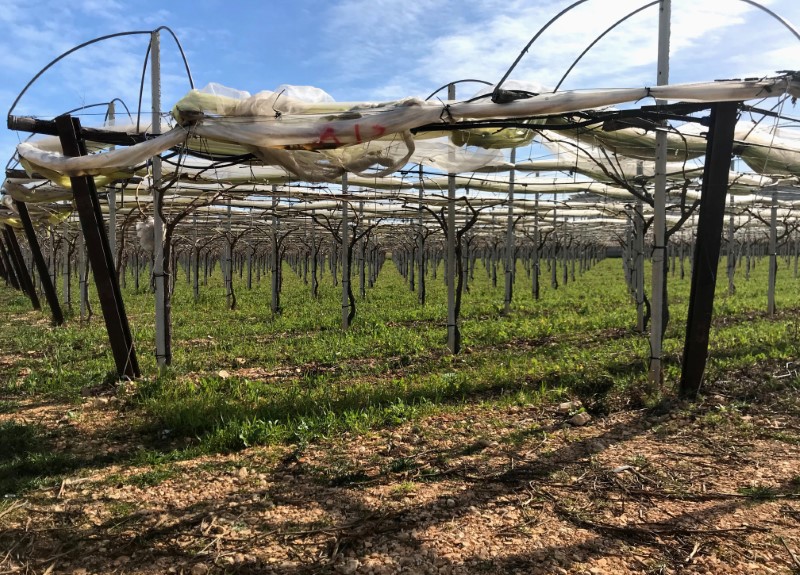By Valentina Za and Giancarlo Navach
BARI, Italy (Reuters) - Grape exporters in Puglia – the heel on Italy's boot -- don't have time for debates about European solidarity bonds.
By now, they would normally have loans in place to buy the Italia and Regina varieties of grapes that will soon bud on local vines, destined for fruit bowls around the world.
But normal banking transactions, like almost every other economic activity, have ground to a halt as the coronavirus sweeps through Italy, killing more people than anywhere else in the world and decimating the euro zone’s third largest economy.
With each passing day, revenue prospects get dimmer and with them the hope of credit relief from banks. It's a downward spiral that is particularly acute in southern Italy and risks widening the gap with the richer north, where before the pandemic struck, income levels were twice as high and unemployment was nearly a third of the rate of the south.
“Coronavirus paranoia is hurting sales of our produce abroad. Orders from France and Germany have stopped. And if the situation doesn't improve we won't find seasonal workers for the harvest,” said Luca Lazzaro, head of regional farming lobby Confagricoltura Puglia.
Facing a steep recession, Italy has called for Europe to issue so-called “corona bonds” to alleviate the financial pain from the pandemic, a move some richer countries, such as Germany, oppose.
In the meantime, major Italian banks have earmarked billions of euros to support stricken businesses and the government has pledged to guarantee up to 80% of new loans. But an unprecedented drop in commerce, required to halt the spread of the virus, makes credit decisions difficult.
Those difficulties are compounded in the south, where banks are weaker and companies are less profitable than their northern rivals and more reliant on bank credit for their day-to-day financing.
Having prioritized problem banks in the center and north of the country over the past five years, Italy had only started to tackle the bad debt problems at its southern lenders when the coronavirus struck.
Rome had moved to bail out Popolare di Bari, the region's largest lender, in December with over a quarter of its loans, mainly to fragile local businesses, in arrears. Another 15 smaller southern banks are in a risky position, according to Italy’s central bank, with one in ten loans in trouble after accounting for loss provisions, more than twice the national average.
"This is a country divided in two. The south's frail ecosystem needs local credit," said Adriano Giannola, an academic and the chairman of south-focused think-tank Svimez.
"Authorities thought it was best to have the south's biggest banks merged into the large northern-based groups. But banks first allocate credit to the least risky borrowers and that puts southern businesses at a disadvantage."
Almost 40% of southern businesses were ranked as "vulnerable" or "at risk" before the coronavirus crisis, according to credit data group Cerved, compared to a national average of 24%. Cerved said the pandemic could boost those scores by a quarter.
A POSITIVE TREND
At the start of this year, things had been looking up for Bari, Puglia's capital city.
After a decade-long downturn, more businesses, including cafes, restaurants and B&Bs, were opening than closing and employment levels were rising partly thanks to tourism – an industry obliterated by the virus.
"I'm not saying we were over the crisis that started in 2009, but we did have a positive trend,” said Beniamino Campobasso, head of local retail industry association Confesercenti Puglia.
Despite public debt running at more than 1.3 times domestic output, Rome is planning additional support for the economy that could double the 25 billion euro ($27 billion) stimulus package announced earlier this month.
The government has also told banks to give firms a six-month moratorium on their debts but the measure applies only to businesses that were in good health before the pandemic – leaving troubled firms on the hook.
The moratorium means something of a reprieve for the fruit dealers and farmers of Puglia, whose olive oil industry has been devastated by a bacteria that has killed thousands of olive trees.
“It’s definitely something,” said Lazzaro, the head of the regional farming lobby.
Before the coronavirus outbreak started shutting things down, Popolare di Bari’s temporary administrators were calling on borrowers to repay existing debts, triggering alarm among local businesses.
Popolare di Bari declined to comment.
But a debt holiday will only work if local firms can get fresh funding. Quick decisions on credit, not easy at the best of times, are even more difficult with bank staff confined at home, dealing with a flurry of loan applications.
"To still be here to start again when the ban lifts we need immediate and easy access to credit," said Campobasso.
"Let's speak plainly: that is not something we're used to around here. Credit has become more and more difficult with each passing year."
